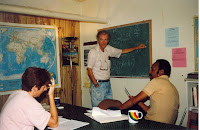Tom Brown is a recent recipient of the “Trevor DaCosta award for longtime volunteers and friends of Academy of Hope.” He has volunteered at Academy of Hope since 1985. When asked to appear on the AoH website he shared this letter...
Here are a few words from a long term volunteer:

As I neared retirement in the late 80's after 30 years in government -- always a long arms reach away from the people we tried to serve -- I wanted to be closer. At the same time, my church was launching programs designed to help less advantaged neighbors. One was a GED school for adults called the Academy of Hope. I signed on in the early days to help founder, Marja, by teaching math. We were very small in the early days, but every year found ways to broaden our reach.
I learned that adults always have more going on in their lives than learning bookish subjects; things like health and family that seem more important, even to me, than the day's homework. Olive, for instance had trouble staying awake and Marja discovered that Olive's bed had no mattress. One day after class Marja invited me to give her a hand. That day ended as we squeezed a double mattress into Marja's car, then into an elevator, and onto Olive's box spring. An Academy of Hope education reaches beyond books.
Chanta grew up in Pol Pot's Cambodia; his escape to Washington where he joined siblings and cousins is a story in itself. In his early classes with us, there was only one goal: how to read a map to Atlantic City. One cousin had a car, and all had a plan to get rich at the gaming tables. His study paid off, they got to Atlantic City, but I never heard about any winnings and never heard of a return trip. But Chanta did get a job, and we soon heard that his focused study habits served him well with employee-of-the-week awards and promotions.

Mary and her infant son John were so close that John came to class while she started a new life free from alcohol and drugs. Mary's two daughters were separated from the family in foster homes. Several years of study brought Mary health care employment as valued staff at a home for HIV-infected mothers. She also became self-supporting and she re-gathered her family. But, within months, a hereditary disease attacked Mary's brain. She became totally disabled and was hospitalized for some years unto death. It was a tragic ending made bearable perhaps, by the recovery and re-gathering that preceded her disease.
I loved to hear Mattie tell her story because Mattie is even older than me. In Georgia, her mother taught her good work habits; by the time she was 10, she and her sister together could pick a bale of cotton each day. Years later when Mattie moved to Washington, she opened a corner store. Since it went well, she did the same for siblings as they came north. When I met her three years ago, she was not after a GED, she did not need a better job. She just wanted to read and write better, and she wanted to learn arithmetic.
Mattie owned seven houses in D.C. including one on 14th Street where she was making some changes to keep up with neighbors near the center of Columbia Heights. It's true, she did not know how to add and multiply but she surely had good business instincts.
Over the years, we've celebrated hundreds of graduations with students and their families. Lives have changed. But the life I'm writing about today is mine. Perhaps I've taught a little, though more often; I've just been present when the student was ready to learn. And me, I've been close enough to meet and appreciate a bunch of great people whom I'd never have met but for The Hope.
Best,
Tom
We spent a few sessions talking about preventive screenings... One student visited his doctor with the list of screenings recommended for him and asked his doctor to schedule them. The doctor stared at him in surprise, probably not expecting that he would even know what to request! Yet, the doctor promised to schedule the tests in the future.





